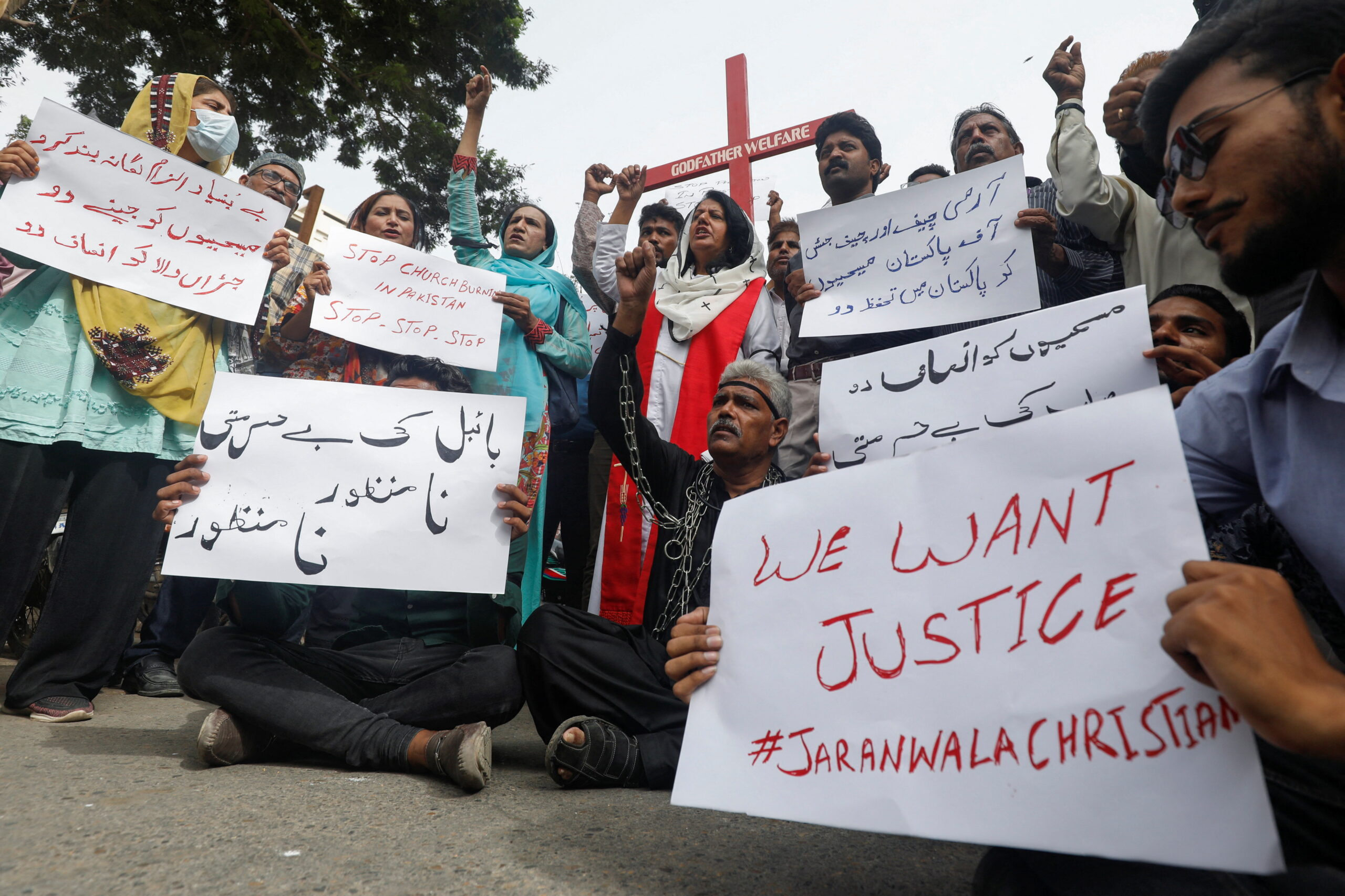Pakistan’s blasphemy laws allow unsubstantiated allegations to embroil defendants in grueling cases, with a devastating impact on their lives, a Clooney Foundation for Justice (CFJ) report revealed today, in advance of Pakistan’s upcoming review by the UN Human Rights Committee.
Over a six-month period in 2022, CFJ’s TrialWatch initiative monitored 24 blasphemy cases in Lahore’s courts, observing a total of 252 hearings. Fifteen of the cases involved defendants facing a mandatory death sentence if found guilty, a stark reminder that Pakistan remains one of only seven countries worldwide willing to impose the death penalty for blasphemy. And yet despite the high stakes, in a startling 17 out of the 24 cases monitored, there was no progress at all during the six-month monitoring period, with 217 out of 252 hearings adjourned until a later date, leaving many defendants behind bars in pre-trial detention.
“This report shows a process fraught with significant delays and unfairness, exacerbating the widespread climate of misuse, discrimination and intimidation that has developed around Pakistan’s blasphemy law,” said TrialWatch Expert Zimran Samuel MBE, a barrister at Doughty Street Chambers in London and Visiting Professor in Practice at the London School of Economics. “Pakistan’s blasphemy provisions in their current form and as they are being implemented are in urgent need of reform and reconsideration.”
Pakistan’s blasphemy laws are flatly inconsistent with international standards, including the International Covenant on Civil and Political Rights (ICCPR), which protect “displays of lack of respect for a religion or other belief system.” In advance of Pakistan’s review, scheduled to begin on October 17, the UN Human Rights Committee has requested information on “concrete measures taken to repeal all blasphemy laws or to amend them in compliance with the strict requirements of the Covenant” and on “the implementation and impact of the measures taken to prevent misuse or abuse of the blasphemy law.”
The report shows, however, that abuse of these laws continues. For instance, reports are often filed with the police alleging blasphemy without providing evidence or specifics of the act; indeed, in seven of the 24 cases monitored, the complainant had not even witnessed the alleged blasphemous act themselves. Further, in more than 90 percent of the cases that involved alleged blasphemous speech, the words used were not identified and no details were provided other than vague assertions that they were disrespectful, and in 75 percent of these cases, police reports were filed significantly after the date of the alleged blasphemous act, despite precedent suggesting such delays indicate lack of reliability. The report also revealed that the limited safeguards that do exist to avoid abusive complaints, such as a requirement for government approval over the filing of certain charges, were not followed.
Meanwhile, the accused are often arrested without warrants, with courts rejecting bail without individual consideration, and then stuck in a lengthy cycle of court hearings that are regularly adjourned because complainants and prosecution witnesses do not appear—as found in twenty-eight percent of the adjournments across the cases monitored. These adjournments are occurring despite the fact that the evidence against defendants is often entirely based on witness testimonies.
“The judicial system in Pakistan has completely failed in preventing the abuse and malafide use of the blasphemy laws in Pakistan,” said Hina Jilani, Advocate of the Supreme Court of Pakistan. “While there are concerns regarding the laws as they are currently framed, the way that courts disregard the few procedural safeguards that were added to the legal framework has rendered prosecution in such cases farcical and an epitome of injustice.”
Thus, while most blasphemy convictions are ultimately thrown out on appeal by higher courts, the lengthy process can have a devastating impact on defendants’ lives. In one case, the defendant even thanked the judge for finally convicting him, because he had spent more than a decade in pre-trial detention and could be released for time served.
At the same time, some cases do not even go to trial, with mob violence against those accused of blasphemy on the rise. In June 2024, for instance, a mob lynched a man inside a police station over allegations that he had desecrated the Qur’an.
‘‘The blasphemy laws and the climate around them have seemingly crossed a Rubicon in Pakistan. It remains unlikely that Pakistan will repeal its blasphemy laws. Based on forensic, data-driven analysis, TrialWatch’s new report makes a number of key recommendations regarding better safeguards, which will be key to mitigating ongoing abuse of these laws,’’ Samuel added.
Blasphemy cases in Pakistan consistently violate the accused’s rights to a fair trial and to protection from discrimination, even though these rights are enshrined in the country’s own constitution as well as in international treaties to which Pakistan is a party. For example, in two of the monitored cases, the court appeared to base its judgement on preconceived notions rather than on evidence: inconsistencies in the prosecution’s narrative were dismissed on the grounds that the complainant in the case was a Muslim and “it could not be believed that a Muslim would spin a story in this regard.”
In its report, the Clooney Foundation for Justice calls on Pakistan to abide by its obligations under the ICCPR. Alongside repealing its blasphemy laws, the standards for submitting allegations must be raised, false accusers must face real deterrents, and urgent reforms are needed to ensure that cases are not endlessly adjourned while accused persons remain behind bars.
You can download the report in English here.
About the Clooney Foundation for Justice’s TrialWatch Initiative
TrialWatch monitors criminal trials globally against those who are most vulnerable—particularly journalists, democracy defenders, women and girls, LGBTQ+ persons, and minorities. TrialWatch’s work covers more than 40 countries and has led to persecuted individuals being freed or acquitted, and unfair laws reformed, in dozens of cases. TrialWatch is now building a Global Justice Index that will be the first to rank countries on their justice systems through real-world data.
